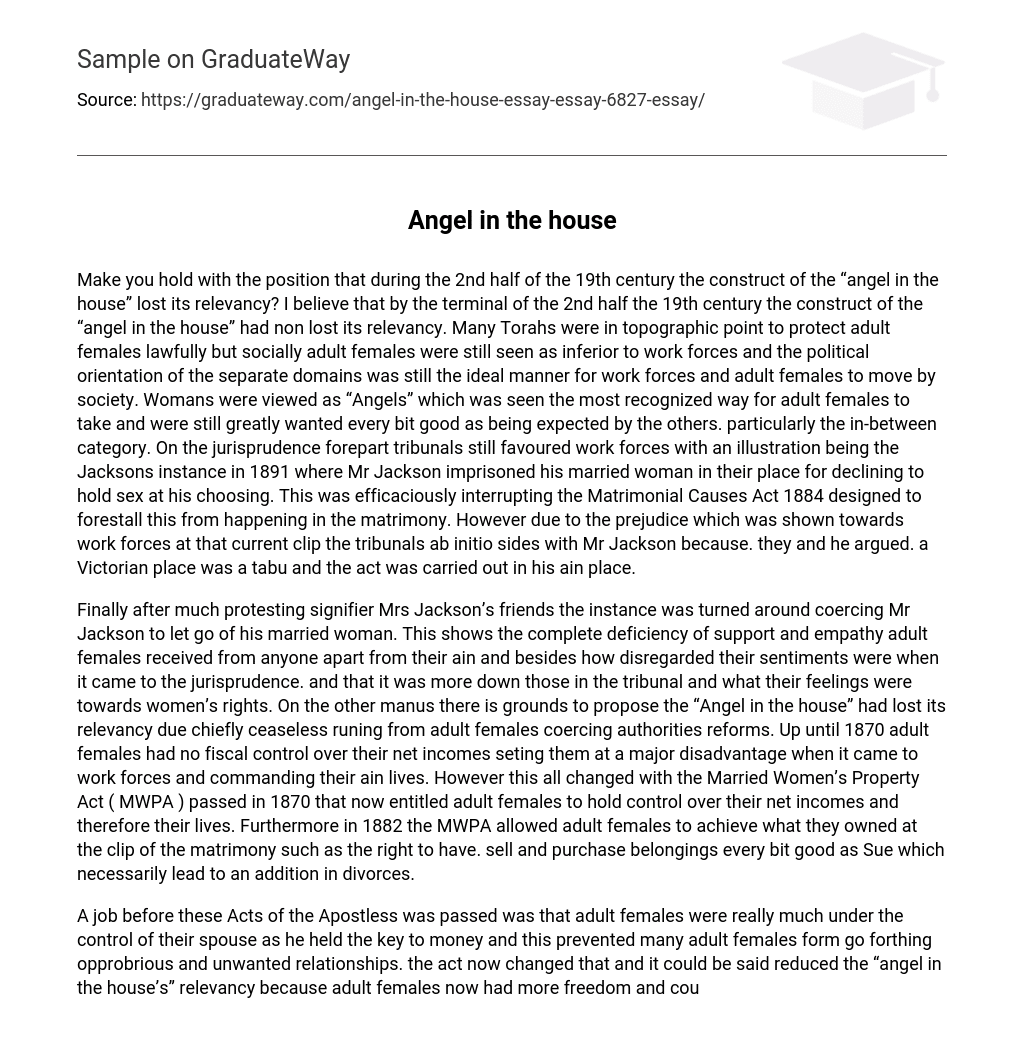Make you hold with the position that during the 2nd half of the 19th century the construct of the “angel in the house” lost its relevancy? I believe that by the terminal of the 2nd half the 19th century the construct of the “angel in the house” had non lost its relevancy. Many Torahs were in topographic point to protect adult females lawfully but socially adult females were still seen as inferior to work forces and the political orientation of the separate domains was still the ideal manner for work forces and adult females to move by society. Womans were viewed as “Angels” which was seen the most recognized way for adult females to take and were still greatly wanted every bit good as being expected by the others. particularly the in-between category. On the jurisprudence forepart tribunals still favoured work forces with an illustration being the Jacksons instance in 1891 where Mr Jackson imprisoned his married woman in their place for declining to hold sex at his choosing. This was efficaciously interrupting the Matrimonial Causes Act 1884 designed to forestall this from happening in the matrimony. However due to the prejudice which was shown towards work forces at that current clip the tribunals ab initio sides with Mr Jackson because. they and he argued. a Victorian place was a tabu and the act was carried out in his ain place.
Finally after much protesting signifier Mrs Jackson’s friends the instance was turned around coercing Mr Jackson to let go of his married woman. This shows the complete deficiency of support and empathy adult females received from anyone apart from their ain and besides how disregarded their sentiments were when it came to the jurisprudence. and that it was more down those in the tribunal and what their feelings were towards women’s rights. On the other manus there is grounds to propose the “Angel in the house” had lost its relevancy due chiefly ceaseless runing from adult females coercing authorities reforms. Up until 1870 adult females had no fiscal control over their net incomes seting them at a major disadvantage when it came to work forces and commanding their ain lives. However this all changed with the Married Women’s Property Act ( MWPA ) passed in 1870 that now entitled adult females to hold control over their net incomes and therefore their lives. Furthermore in 1882 the MWPA allowed adult females to achieve what they owned at the clip of the matrimony such as the right to have. sell and purchase belongings every bit good as Sue which necessarily lead to an addition in divorces.
A job before these Acts of the Apostless was passed was that adult females were really much under the control of their spouse as he held the key to money and this prevented many adult females form go forthing opprobrious and unwanted relationships. the act now changed that and it could be said reduced the “angel in the house’s” relevancy because adult females now had more freedom and could back up themselves instead than being financially tied to their spouse and holding to be the “Angel in the house” . The unfairness of the sexual dual criterion is highlighted here as adult females were merely able divorce their hubbies if the committed incest or long thesis where as work forces could disassociate their married woman for both the grounds every bit good as criminal conversation which adult females could non. leting work forces to hold other relationships within their matrimony and be unfaithful with adult females unable to make anything about it.
In decision that although there was important advancement towards extinguishing the construct of the “Angel of the house” such as the MWPA which were significant accomplishments but there is more grounds to propose that during the 19th century the construct of the “Angel of the house” had non lost its relevancy as adult females still viewed as inferior to work forces. This was chiefly because although many Torahs had been changed the positions of society had non and this was the cardinal factor as most still did non value adult females or their rights. A major illustration was the Jackson instance with the hubby interrupting the jurisprudence but the tribunal siding with him because he was a adult male and she a adult female. they were blatantly bias and merely changed this when forced by the might of Mrs Jackson’s friends and protagonists. Society controlled whether or non the “Angel the house” construct still applied and it still did in the 2nd half of the 19th century.





